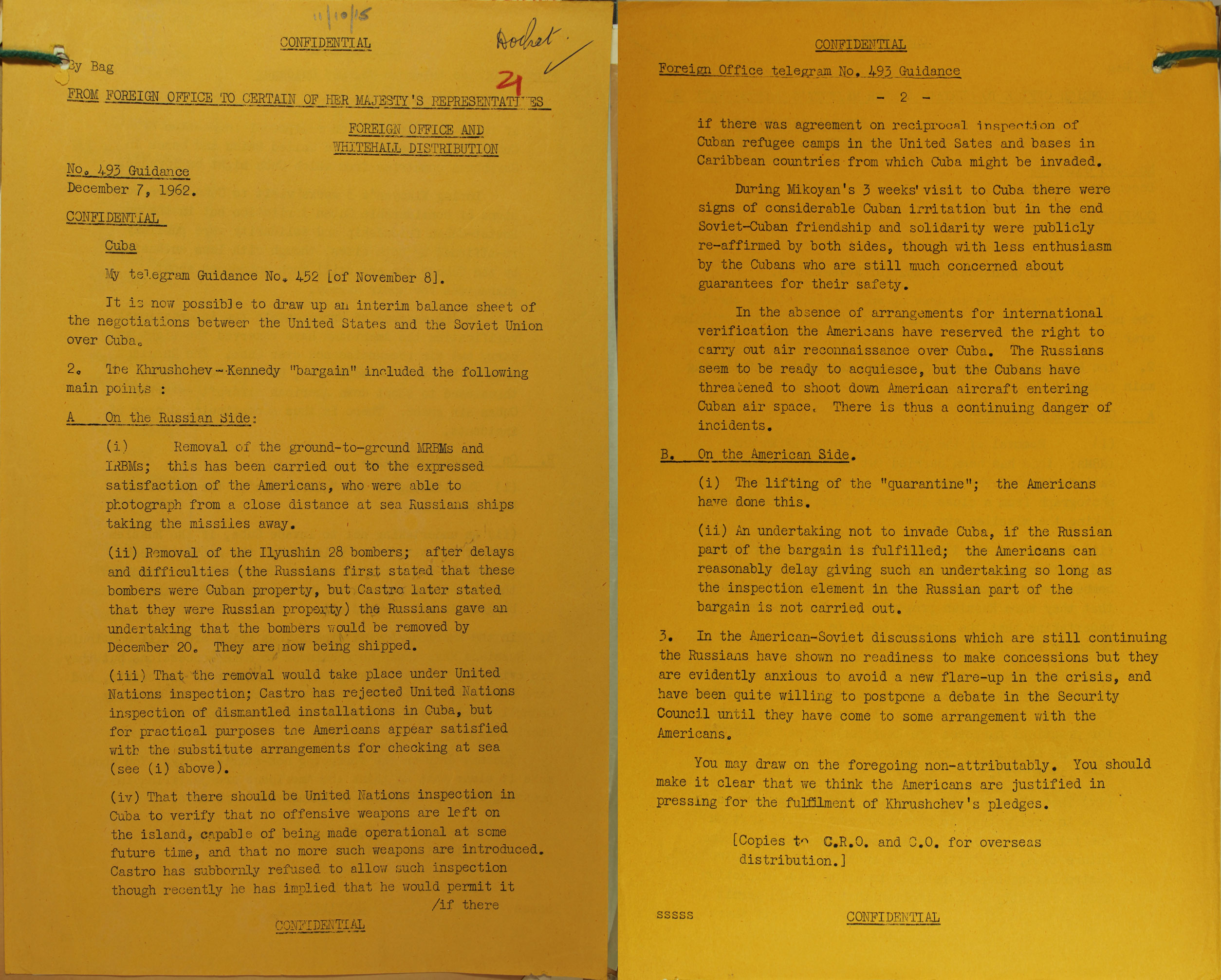
British government analysis of the agreements between the US and USSR which ended the Cuban Crisis (Catalogue ref: DEFE 13/482)
Transcript
CONFIDENTIAL
By bag
FROM FOREIGN OFFICE TO CERTAIN OF HER MAJESTY’S REPRESENTATIVES
FOREIGN OFFICE AND WHITEHALL DISTRIBUTION
NO.493 Guidance
December 7, 1962
CONFIDENTIAL
Cuba
My telegram Guidance No. 452 [of November 8].
It is now possible to draw up an interim balance sheet of the negotiations between the United States and the Soviet Union over Cuba.
- The Khrushchev-Kennedy “bargain” included the following main points:
A. on the Russian Side:
- Removal of the ground-to-ground MRBMs and IRBMs [medium and intermediate-range ballistic missiles]; this has been carried out to the expressed satisfaction of the Americans, who were able to photograph from a close distance at sea Russians ships taking the missiles away.
- Removal of the Ilyushin 28 bombers; after delays and difficulties (the Russians first stated that these bombers were Cuban property, but Castro later stated that they were Russian property) the Russians gave an undertaking that the bombers would be removed by December 20. They are now being shipped.
- That the removal would take place under United Nations inspection; Castro has rejected United Nations inspection of dismantled installations in Cuba, but for practical purposes the Americans appear satisfied with the substitute arrangements for checking at sea (see (i) above).
- That there should be United Nations inspection in Cuba to verify that no offensive weapons are left on the island, capable of being made operational at some future time, and that no more such weapons are introduced. Castro has stubbornly refused to allow such inspection though recently he has implied that he would permit it there was agreement on reciprocal inspection of Cuban refugee camps in the United [States] and bases in Caribbean countries from which Cuba might be invaded.
During Mikoyan’s 3 weeks’ visit to Cuba there were signs of considerable Cuban irritation but in the end Soviet-Cuban friendship and solidarity were publically re-affirmed by both sides, though with less enthusiasm by the Cubans who are still much concerned about guarantees for their safety.
In the absence of arrangement for international verification the Americans have reserved the right to carry our air reconnaissance over Cuba. The Russians seem to be ready to acquiesce, but the Cuban have threatened to shoot down American aircraft entering Cuban air space. There is thus continuing danger of incidents.
B. On the American side.
- The lifting of the “quarantine”; the Americans have done this.
- An undertaking not to invade Cuba, if the Russian part of the bargain is fulfilled; the Americans can reasonably delay giving such an undertaking so long as the inspection element in the Russian part of the bargain is not carried out.
- In the American-Soviet discussions which are still continuing the Russians have shown no readiness to make concessions but they are evidently anxious to avoid a new flare-up in the crisis, and have been quite willing to postpone a debate in the Security Council until they have come to some arrangement with the Americans.
You may draw on the foregoing non-attributably. You should make it clear that we think the Americans are justified in pressing for the fulfilment of Khrushchev’s pledges.
[Copies to C.R.O. and C.O. for overseas distribution]
